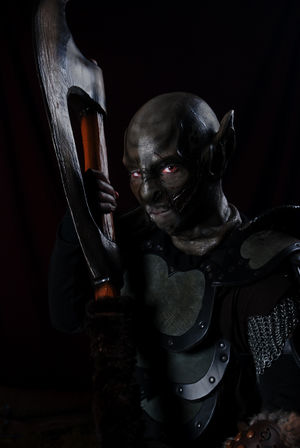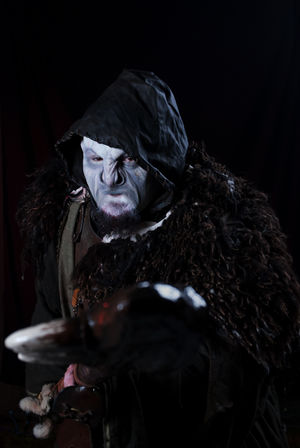Imperial Orcs leadership
Most Imperial Orcs choose to belong to a legion. The legions are organized along military lines, and choose one of the Imperial Orc armies to be part of. In practice the legions are a cross between a regiment and an informal family group. Although not all the members of a legion are warriors, or even members of the army, the camaraderie and mindset of the career soldier tends to permeate throughout a legion.
Each orc legion chooses its own name and symbols but most can also be identified by their favoured fighting style.One legion may have a bias for plate armour and pole-weapons, while another favours sword and shield. Warriors are usually expected to have at least a basic mastery of their legion's favoured style. Each legion is fiercely proud of its identity in battle, and a healthy, good natured rivalry exists between legions with regard to tactics and combat style. This rivalry is put aside on the battlefield, and warlords are careful to ensure that it never undermines loyalty and service to the Empire; the place for combat between members of rival legions is the fighting pit, not the battlefield.
Banners are particularly important to Imperial Orcs. Legion camps are often decorated with banners displaying legion symbols, as Orcs find it reassuring to be surrounded by images that reinforce their group identity. Many bear an image of the horse as a symbol of the Empire alongside specific legion markings and colours. Imperial Orcs differentiate between banners, which are general symbols of legion identity, and a legion standard. Many legions have a legion standard, which is a symbol of the legion's pride. Trophies from particularly notable legion members or items of exceptional worth that once belonged to someone in the legion are often added to a legion standard.
Legions chose their own commanders, called warlords, with individuals chosen for their ability to provide clear effective leadership in battle, according to the traditions of the individual legion. Orcs expect their leaders to be inspirational as well as astute so the majority of warlords are powerful warriors who lead from the front. Those who lead by cunning alone need to be particularly smart and their legions are often small but very tight knit. Warlords appoint members of the legion to a chain of command beneath them, so that if they fall in battle they can be quickly replaced – the life of the legion is always more valuable than the life of any individual.
Most legions have a clear chain of command with harsh punishments for disloyalty or disobedience. Imperial Orcs usually have little sympathy with individuals who refuse to follow orders. In battle, those who find themselves at odds with a legion’s leadership face summary court martial, at other times they are usually expelled from the legion. In such cases a group of orcs usually form their own rival legion, while an individual must attempt to join another legion or face existence alone.
Few Imperial orcs have much time for or interest in the sophisticated political intrigues so popular in places such as the League. They are perfectly capable of understanding that a senator might say one thing and mean another, but among themselves they expect plain talking. In part this is because Imperial Orcs expect and demand an unyielding chain of command. Leaders amongst the orcs will usually explain the details of a plan because they want their followers to understand it, but they rarely if ever feel the need to justify it. In the view of most Imperial Orcs you either trust your leaders implicitly or you choose someone different to follow. Undermining your leaders weakens the whole legion, and is regarded with contempt when done to advance your own position.
Generals
With no territories of their own, the Imperial Orcs do not possess senators. As a result the effective leadership of the nation lies with the warlords, and most especially with the two Imperial Orc generals. Generals are chosen by bouts between legion members under rules agreed when the orcs joined the Empire. Under this system, any warlord wishing to be considered presents themself along with their legion to the civil service overseeing the election process. The warlord of the largest legion puts forward half their members and the opposing warlord then picks members from their own legion to duel with them. The remainder of the second warlord’s legion are then presented and the warlord of the largest legion chooses members remaining from their own legion to duel them. The legion that wins the most duels may then choose the general.
If three or more legions are contesting a position, then each legion presents a third of its force for the others to choose members to fight in order of size. If the contest is a draw, then those warlords with the highest number of wins must fight a final fight with each other to determine the winner. Since the warlord with the smaller legion will not have sufficient members to pair off for each fight, they have two choices, they may find a volunteer to fight for them from outside their legion – or they may choose a contestant from an earlier fight to contest a second bout. In the first instance they may choose anyone, but if the individual chosen is not a member of their legion then they do not score a point for winning (but they do deny their opponent a point by not losing). In the second case they may win and add to their legion’s score, but they must fight without any magical or herbal healing between the first and second bout.
Imperial Orcs are proud of this process, which they believe works well to find the best candidates to be generals. Inspirational warlords, and warlords whose leadership keeps their legion members alive, tend to have the largest legions, which is a natural advantage in the contest. However there is considerable tactics in choosing who will fight against whom, it is considered a weak strategy to pit your best warriors in order against their best – the more a warlord knows about the fighting capabilities of legion members, the more effectively they can pick the fights.
It is not uncommon for politics to play an important role in the process. Often there is only one clear contender, in which case the legions will usually arrange a ceremonial contest to ensure that due propriety is done. Contests may also see political deals and agreements- it is considered exceptionally poor form to not bring every member of your legion to the contest, but private deals between warlords and individual warriors are acceptable. It is not unknown for a winning legion to choose the other warlord to be general, a process which brings great honour to all participants The winning legion is assumed to be acting in the best interests of the Imperial Orcs, while the selected general is considered to be so inspirational that they have been chosen despite not being strong enough to win the contest.
Since Autumn 377YE, the Imperial orc generals have also been responsible for appointing the Advisor on orc affairs, an officer of the Imperial Senate with responsibility to advise the Senate on orc matters. The selection method is seen as foreshadowing the likely method of appointing Imperial orc senators - a reversal of the normal method whereby senators would select generals.
Shamans
Shamans play an important role in the leadership of Imperial Orc society. Their link to the orc ancestors is considered to provide valuable insight and wisdom. By tradition shamans are consulted by Imperial Orc generals and warlords before significant decisions are made, so that they can provide the ancestor’s guidance. Many warlords have a specific favoured shaman they regularly consult, while the generals are more likely to speak to all the shamans present. Individual Orcs also seek out shamans for advice when they make important decisions, either to receive guidance in making up their minds or to see how the ancestors feel about the course of action they have decided on.
It is not uncommon to ignore the advice shamans give though it should always be weighed and considered. The orcs' barbarian ancestors do not understand the life of the Imperial Orcs, and their voices tend to be the loudest of those heard by the shamans. There are exceptions; some shamans possess enough wisdom that their advice is valuable even when it does not come directly from an ancestor, and other shamans have an affinity for one or more helpful ancestors whose words often seem to be more relevant to their Imperial descendants.
Leading a territory
When the Imperial Orcs joined the Empire they agreed that their generals would eventually pick their senators. In the case that the generals cannot unanimously decide on who will take the senate seat for a territory, the senate as a whole will select from all available candidates.
Prominent Imperial Orcs Warbands
A short list of well-known Imperial Orcs bands who regularly attend Anvil can be found here.

